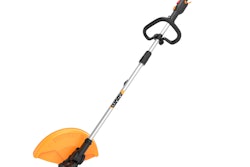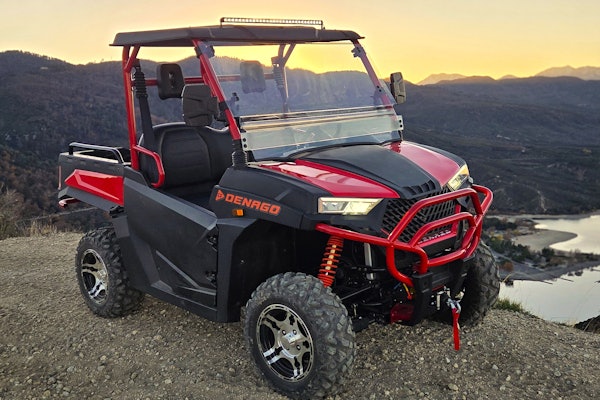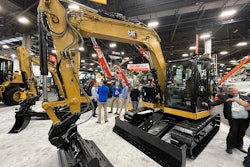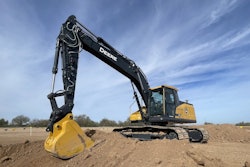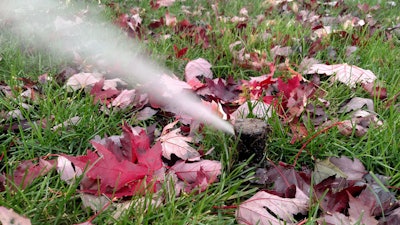 Photo: Conserva Irrigation
Photo: Conserva IrrigationWith the winter weather upon us and many areas of the country already experiencing snowfall and icy conditions, it’s time to take a look at how green industry experts are making sure their crews, equipment and jobsites are appropriately transitioned over to winter.
Early preparation
For Dave Elliott, fleet manager for Acres Group in Chicago, Illinois, preparing employees and equipment for the impending winter weather begins in the fall.
“We start recruiting crews in September and continue training throughout the winter season,” he says. “We start servicing skid steers, snow blowers, snow plows and salters in July while also maintaining landscape equipment. We have a schedule of services that we pace out to make sure that all winter equipment is ready by mid-November.”
Elliott says the company stays in contact with customers by meeting with them before the snow season begins and explaining what the expectations will be and what the project readiness lists will consist of. Additionally, Elliott says they send customers pre-season information dealing with their contract, services the company offers and contact information.
Miles Ledford, owner of Conserva Irrigation Chattanooga, says he’s learned through the years that systems play a vital role in the success of a business.
“We have approached every decision with regards to preparing our crews, customers and equipment by asking one simple question – is it scalable?” says Ledford. “Will this solution work for our first one hundred customers equally as well as our thousandth customer?”
Ledford says when it comes to training his technicians on the proper ways of winterizing irrigation systems for customers, it comes down to using the “Conserva Way.”
“Instead of only hooking up an air compressor to the irrigation system and blowing it out, our technicians thoughtfully use the compressed air as a diagnostic tool,” Ledford says. “It allows us to have Superman vision for a day. Water leaks down, while air and water bubbles up, allowing us to find small leaks and defects in the system that otherwise go undetected.”
These findings, Ledford notes, are summarized on the company’s Winterization Assessment form, which is then delivered to each of their customers.
Common mistakes
When researching the irrigation and green industries before launching his company, Ledford says he had discovered a common theme among landscapers and irrigators.
“They tend to view the winterization process as a commodity – a quick exchange of service for a nominal price,” he says. “We see it as an opportunity to roll out the red carpet for our new customers and to wow them with our Winterization Assessment.”
With a positive winter experience in the bag, Ledford says customers are much more inclined to invite them back in the spring to prep their systems for summer, perform repairs needed after winter and talk to them about how to make their systems more efficient.
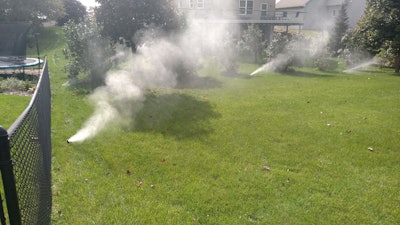 Photo: Conserva Irrigation
Photo: Conserva IrrigationElliott says the biggest mistake he’s noticed in his time in the green industry is that some companies wait until the last minute to start planning for their winter transitioning and prep work and prove to be unprepared early in the season.
“Most of our equipment gets repurposed for the winter season and we start our process early to ensure we’re 100 percent ready when winter arrives,” he says.
If you find your customers not fully understanding the importance of preparing for and transitioning their lawns and irrigation systems to accommodate winter, consider explaining to them the ramifications that can come from being unprepared.
“Catastrophic damage to your irrigation system can occur if you do not winterize it properly,” Ledford says. “If you are a DIY-type of person, you have to ask yourself if it is worth risking your system and thousands of dollars only to save some money upfront. Additionally, if you hire a company or person that views winterizing irrigation systems as a hobby or as a way to make a few bucks in the fall, is it worth risking not hiring a professional?”
Not only can improper preparation prove detrimental to irrigation systems, it can cause your customer’s lawn to suffer as well. According to Elliott, the reason behind winter lawn preparation is to make sure the lawns are receiving the proper nutrients to survive the winter months and thrive once again in spring.
Advice to others in the industry
For those just starting out in the green industry, Elliott’s advice is to always stress to your crews and customers the importance of equipment inspections and preseason maintenance, as he says these are the keys to successful winter season.
“Create a fixed schedule to work by and stick to it,” he says.
Since working outside in the elements can prove to be fickle on most days, Elliott urges fellow green industry professionals to always expect the unexpected and be as prepared as possible.
“There are always a lot of moving pieces,” he says. “Sometimes, storms can show up earlier or unexpectedly faster and surprise you. When that happens, it leads to a long day. So, the more prepared you are, the better you will be able to navigate those unexpected situations.”
Ledford recommends always putting your best foot forward with showing customers you are a professional.
“Differentiate yourself from the masses by doing your homework and truly learning how to winterize an irrigation system correctly,” he says. “Once you do that, build systems around training your staff so that you can effectively and efficiently build scale.”
Ledford has firsthand experience dealing with irrigation systems that were improperly winterized by service providers before him, and it is no walk in the park trying to right these wrongs.
“The vacuum breaker was shattered, the mainline and valve manifolds were cracked and some of the lateral lines and heads were broken,” he says. “Essentially, the entire system was inoperable, and a considerable amount of money had to be invested to repair and rebuild the system.”
This, he stresses, is why it’s important to do the job right the first time around. Not only will it save your company time, money and headaches, it will also keep your customers content and eager to bring you back in the spring or recommend you to their friends.


